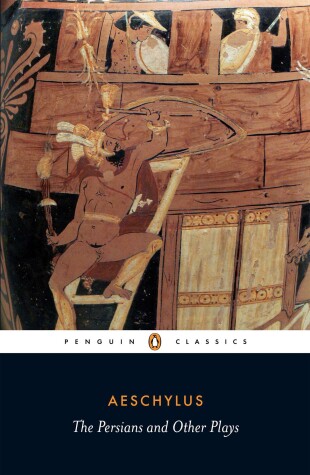Reviewed by brokentune on
The book contains the following:
The Persians
Seven Against Thebes
The Suppliants
Prometheus Bound
Each play comes with a thorough introduction of the play itself as well as details of what we (think we) know about the history of the play's original performances and how they may have influenced other Classical plays and playwrights, references in which inevitably have been used to date the plays themselves.
This is followed by more commentary and notes on the plays and on related plays that may have existed.
For example, it appears from the commentary that it has long been unclear in what order Aeschylus wrote the plays:
The production of 472 is the only one by Aeschylus that is known to have consisted of four plays whose stories were, on the face of it, unrelated - indeed, they were not even placed in proper chronological order. The first play was Phineus, about an episode in the saga of the Argonauts. This was followed by The Persians; then, jumping back to the heroic age, by Glaucus of Potniae, about a man who subjected his horses to an unnatural training regime and was devoured by them after crashing in a chariot race; and then by a satyr play about Prometheus ("Prometheus the Fire-Bearer" or "Fire-Kindler"). Repeated efforts have been made to find method behind the apparent madness of this arrangement, so far with little success.
As entertaining as it is to imagine someone making a simple mistake when noting down the running order of the plays in Ancient times, this must be quite frustrating to Classicists.
It took me way longer to read this collection than I thought but I don't regret a single minute of it.
While some of the concepts discussed and displayed in the plays were not instantly recognisable to a 20th- and 21th-century reader, the context and explanatory notes provided by Alan H. Sommerstein were so excellent that each of the plays not only made sense but actually made it a joy to discover how Aeschylus' may have raised smiles in some and incensed others of his audiences.
And some ideas and points of view in his plays - especially the description of the Persian's defeat (in The Persians), the exposition that women may refuse marriage (in The Suppliants), and some of the rather humanist views of Prometheus (in Prometheus Bound) - were quite different from what I had expected. Or rather, different from what I have come to expect from the Ancient Greek world when coming to Ancient Greek drama after reading the Greek myths (in whichever version: Apollodorus, Ovid, or any of the modern retellings). But even coming to Aeschylus with some familiarity of other playwrights such a Sophocles, I found Aeschylus surprisingly empathetic, satirical, and ... oddly modern.
CHORUS: You didn't, I suppose, go even further than that?
PROMETHEUS: I did: I stopped mortals foreseeing their death.
CHORUS: What remedy did you find for that affliction?
PROMETHEUS: I planted blind hopes within them.
CHORUS: That was a great benefit you gave to mortals.
PROMETHEUS: And what is more, I gave them fire.
It is easy to think of Prometheus only as the rebel who went against Zeus' wishes and brought fire to mankind, but there is more to him. I loved how Aeschylus focuses not on the fire-bringing alone but also on his shared humanity, and on the prophecy that Prometheus knew of that would lead to the decline of Zeus' power, the proverbial Götterdämmerung of the Ancient Greek gods.
PROMETHEUS:
It's very easy for someone who is standing safely out of trouble to advise and rebuke the one who is in trouble.
I knew that, all along. I did the wrong thing intentionally, intentionally, I won't deny it: by helping mortals, I brought trouble on myself. But I certainly never thought I would have a punishment anything like this, left to wither on these elevated rocks, my lot cast on this deserted, neighbourless crag. Now stop lamenting my present woes: descend to the ground and hear of my future fortunes, so that you will know it all to the end. Do as I ask, do as I ask. Share the suffering of one who is in trouble now: misery, you know, wanders everywhere, and alights on different persons at different times.
Reading updates
- Started reading
- 14 May, 2020: Finished reading
- 14 May, 2020: Reviewed
